人称代词名词所有格
人称代词名词所有格
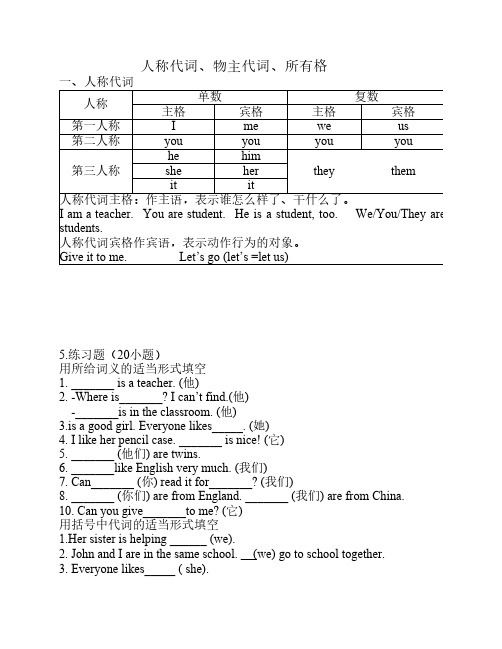
一、人称代词
人称
单数
主格
宾格
复数
主格
宾格
第一人称
I
me
we
us
第二人称
you
you
you
you
he
him
第三人称
she
her
they
them
it
it
人称代词主格:作主语,表示谁怎么样了、干什么了。
I am a teacher. You are student. He is a student, too. We/You/They are
二、物主代词
数
单数
复数
人称
第一 第二
第三
第一 第二人
类别
人称 人称
人称
人称 称
形容词性物主代词 my your his her its our your
名词性物主代词 mine yours his hers its ours yours
形容词性物主代词(my/your/his/her/its/our/their)+名词(用于修饰名词)
students.
人称代词宾格作宾语,表示动作行为的对象。
Give it to me.
Let’s go (let’s =let us)
5.练习题(20小题) 用所给词义的适当形式填空 1. _______ is a teacher. (他) 2. -Where is_______? I can’t find.(他)
-_______is in the classroom. (他) 3.is a good girl. Everyone likes_____. (她) 4. I like her pencil case. _______ is nice! (它) 5. _______ (他们) are twins. 6. _______like English very much. (我们) 7. Can_______ (你) read it for_______? (我们) 8. _______ (你们) are from England. _______ (我们) are from China. 10. Can you give_______to me? (它) 用括号中代词的适当形式填空
人称代词物主代词反身代词及名词所有格
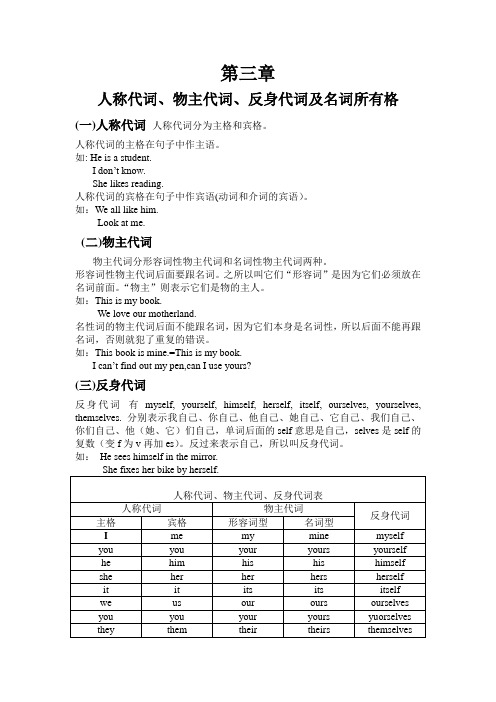
第三章人称代词、物主代词、反身代词及名词所有格(一)人称代词人称代词分为主格和宾格。
人称代词的主格在句子中作主语。
如: He is a student.I don’t know.She likes reading.人称代词的宾格在句子中作宾语(动词和介词的宾语)。
如:We all like him.Look at me.(二)物主代词物主代词分形容词性物主代词和名词性物主代词两种。
形容词性物主代词后面要跟名词。
之所以叫它们“形容词”是因为它们必须放在名词前面。
“物主”则表示它们是物的主人。
如:This is my book.We love our motherland.名性词的物主代词后面不能跟名词,因为它们本身是名词性,所以后面不能再跟名词,否则就犯了重复的错误。
如:This book is mine.=This is my book.I can’t find out my pen,can I use yours?(三)反身代词反身代词有myself, yourself, himself, herself, itself, ourselves, yourselves, themselves. 分别表示我自己、你自己、他自己、她自己、它自己、我们自己、你们自己、他(她、它)们自己,单词后面的self意思是自己,selves是self的复数(变f为v再加es)。
反过来表示自己,所以叫反身代词。
如:He sees himself in the mirror.(四)名词所有格名词所有格表示所属关系,就是“……的”的表达方式。
如:玛丽的儿子Mary’s son.学校的大门the gate of the school名词所有格可分为三种:1、有生命名词所有格2、无生命名词的所有格①无生命名词所有格一般用“of+名词”的结构表示。
如:the gate of the school 学校的大门the door of the classroom 教室的门②有些表示时间、距离以及国家等无生命的名词,可以在词尾加’s或’如:a、表时间:today’s newspaper (今天的报纸)b、表距离:ten miles’ distance (十英里的距离)c、表国家、城市等实体:China’s future (中国的未来)3、双重所有格双重所有格由“of+名词所有格”如:a friend of my father’s 我爸爸的一个朋友或“of+名词性物主代词”如:a friend of mine 我的一个朋友(五)用下列词的适当形式填空1. Who is ______( they ) teacher?2. ______( he ) name is Tom .3.This is _____ (I) pen.4. Look at _____( I).5. What’s ______ (you ) name?6. The teacher ask ____ ( you ) to read the book.7. Who is _____ ( he)?8. I like ____ ( he ).9. This is ____( he ) mother.10. The beautiful girl is ______( she ) sister.11. _____ (they ) are my classroom.12. Look at _____ ( they ) . _____ ( they ) are so strong .13. The football is _____ ( they ).14. The pretty woman is _____ ( we) teacher.15. _____ ( we) are good friends.16. Let _____ (we) sing a song together.17. ____ (I) have two big eyes .18. What color are _____( you ) eyes ?19. _____ (I)eyes are blue.20. _____ ( they ) teacher is Tom .(六)选择1> This is _________A: Jack’s T-shirt B: Jack’T-shirt C: T-shirt of Jack2>That is __________A: Doris’ book B: book of Doris C: book to Doris3>These are __________A: drivers’s cars B: drivers’ cars C: cars to drivers4> Those are ________A: mothers’ bags B: mothers’s bags C: bags of mothers5> This is _______A: question ’s answer B: the answer to the question C: the answer of question 6>This is _________A: classroom’s door B: door to classroom C: the door of the classroom7> These are ______A: the bag of the bosses B: bosses’s bags C: bosses’ bags8> This is ______A: the key of the door B: the door’s key C: the key to the door9> ______ is on the desk.A: Kim’s pen .B: Kim’s pen C: the pen of Kim10>_____ is over there .A: My mother’es dress B: My mother’s dress C:The dress of my mother课后练习一、用所给单词适当形式填空1. ________ am a student . _______name is Peter. The book is _______.(I)2. ______ are in China. These are not _______coats. ______ are over there.(their)3. ________ (who) pen is this. I think it’s ________(Bill)4. The book is _________(Mary and Jane)5. The pens are the _________(students)二. 用人称代词填空:1. Tell ___(我们)how to get there.2. Put ___(它们)there.3. ___(他们)say ___(她)is very clever.4. Who is there? It’s ___(我).5. What time is ___? ___’s 12o’clock.6. How far is ___ to the zoo?7. ___ is so cold today.8. Tell ___(我)how far is ___ from Shanghai to Nanking.9. ___’s damp and cold. ___ think ___’s going to rain.10. Show ___ how to do ___.三. 用物主代词填空:1. Is this ___(你的)classroom? No, it’s not ___(我们的). It’s ___(他们的).2. ___(他的)father is a teacher and ___(她的)is an engineer.3. ___(谁的)keys are these? —They are ___(他的), not ___(我的).4. This isn’t ___(我的)car; ___(我的)is being repaired.5. Is the coat ___(你的)or ___(她的)? It’s ___(我的),not ___(她的).6. ___(她的)views of life and very different from ___(我们的).7. This is ___(我的)umbrella and that one is ___(你的).8. This coat of ___(你的)is much nicer than ___(我的).9. Those ties of ___(他们的)must be more expensive than ___(我们的).10. I like ___(你的)better than ___(她的).四. 用反身代词填空:1. The old man lives by ______.2. I am sure I can do it all by _______.3. Mary is old enough to take care of ______.4. Can you carry this box upstairs by _______.5. We can finish this task by _______.。
英语人称代词的四种形式
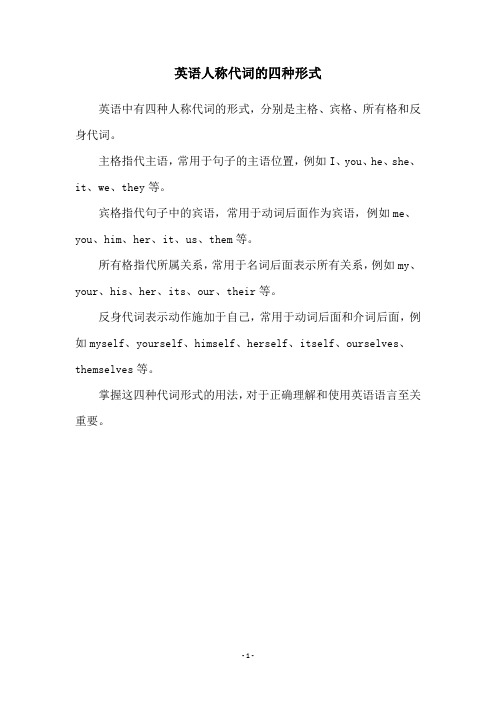
英语人称代词的四种形式
英语中有四种人称代词的形式,分别是主格、宾格、所有格和反身代词。
主格指代主语,常用于句子的主语位置,例如I、you、he、she、it、we、they等。
宾格指代句子中的宾语,常用于动词后面作为宾语,例如me、you、him、her、it、us、them等。
所有格指代所属关系,常用于名词后面表示所有关系,例如my、your、his、her、its、our、their等。
反身代词表示动作施加于自己,常用于动词后面和介词后面,例如myself、yourself、himself、herself、itself、ourselves、themselves等。
掌握这四种代词形式的用法,对于正确理解和使用英语语言至关重要。
- 1 -。
英语中人称代词主格所有格宾格一览表

英语中人称代词主格、所有格、宾格一览表一、人称代词主格(Subject Pronouns)1. 第一人称单数:I(我)2. 第二人称单数:You(你/您)3. 第三人称单数:He(他)、She(她)、It(它)4. 第一人称复数:We(我们)5. 第二人称复数:You(你们/您们)6. 第三人称复数:They(他们/她们/它们)示例:I like reading books.(我喜欢看书。
)You are a great teacher.(你是一位伟大的老师。
)He goes to school bus.(他乘公交车去学校。
)We are planning a trip.(我们在计划一次旅行。
)They play soccer every weekend.(他们每周末踢足球。
)二、人称代词所有格(Possessive Pronouns)1. 第一人称单数:Mine(我的)2. 第二人称单数:Yours(你的/您的)3. 第三人称单数:His(他的)、Hers(她的)、Its(它的)4. 第一人称复数:Ours(我们的)5. 第二人称复数:Yours(你们的/您们的)6. 第三人称复数:Theirs(他们的/她们的/它们的)示例:This book is mine.(这本书是我的。
)Is this pen yours?(这支笔是你的吗?)That car is his.(那辆车是他的。
)The cat is hers.(那只猫是她的。
)三、人称代词宾格(Object Pronouns)1. 第一人称单数:Me(我)2. 第二人称单数:You(你/您)3. 第三人称单数:Him(他)、Her(她)、It(它)4. 第一人称复数:Us(我们)5. 第二人称复数:You(你们/您们)6. 第三人称复数:Them(他们/她们/它们)示例:She called me yesterday.(她昨天给我打电话了。
代词和名词所有格

所有格
所有格:是指有些名词+’s组成的一种格式,用来表示所属关系。
如:Lucy’s(露西的)Robert’s(罗伯特的)
区分:he’s it’s who’s what’s that’s中的’s=is,译为“...是”,这是一种缩写形式。
练习:Lucy’smy daughter.Lucy is,译为“露西是”。
This isLucy’sbag.Lucy’s,译为“露西的”。
代词(pronoun—pron.)
定义:代替某些词在句中发挥作用。
(1)指示代词:
近指
远指
单数
this(这,这个)
that(那,那个)
复数
these(这些)
those(那些)
(2)人称代词:
主格(做主语)
宾格(做宾语)
单数
复数
单数
复数
第一人称
I
we
me
us
第二人称
you
you
you
you
第三人称
he,she,it
they
him,her,it
them
(3)物主代词:指代某物的所属。
形容词性物主代词
(=adj.译为“某人的”)
名词性物主代词
(=n.译为“某人的某物”)
单数
复数
单数
复数
第一人称
my
our
mine
ours
第二人称
your
your
yours
yours
第三人is,hers,its
英语人称代词,物主代词,名词所有格
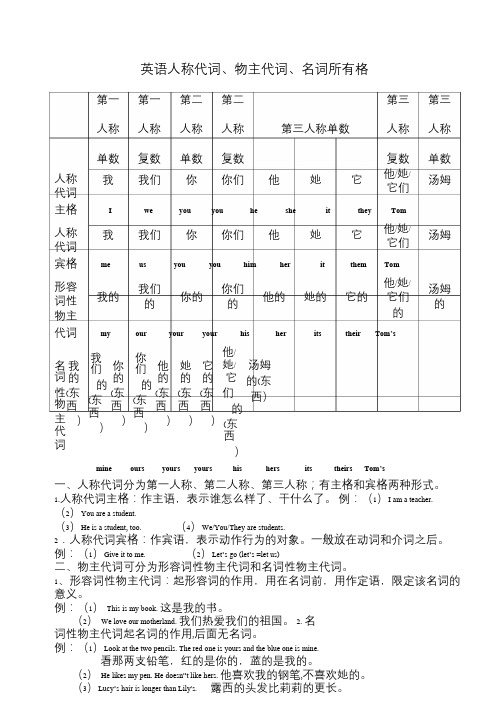
英语人称代词、物主代词、名词所有格第一第一第二第二第三第三人称人称人称人称第三人称单数人称人称单数复数单数复数复数单数人称代词我我们你你们他她它他/她/它们汤姆主格I we you you he she it they Tom人称代词我我们你你们他她它他/她/它们汤姆宾格me us you you him her it them Tom形容词性物主我的我们的你的你们的他的她的它的他/她/它们的汤姆的代词my our your your his her its their Tom’s名词性物主代词我的(东西)我们的(东西)你的(东西)你们的(东西)他的(东西)她的(东西)它的(东西)他/她/它们的(东西)汤姆的(东西)mine ours yours yours his hers its theirs Tom’s一、人称代词分为第一人称、第二人称、第三人称;有主格和宾格两种形式。
1.人称代词主格:作主语,表示谁怎么样了、干什么了。
例:(1)I am a teacher. (2)You are a student.(3)He is a student, too. (4)We/You/They are students.2.人称代词宾格:作宾语,表示动作行为的对象。
一般放在动词和介词之后。
例:(1)Give it to me. (2)Let’s go (let’s =let us)二、物主代词可分为形容词性物主代词和名词性物主代词。
1、形容词性物主代词:起形容词的作用,用在名词前,用作定语,限定该名词的意义。
例:(1)This is my book. 这是我的书。
(2)We love our motherland. 我们热爱我们的祖国。
2. 名词性物主代词起名词的作用,后面无名词。
例:(1)Look at the two pencils. The red one is yours and the blue one is mine.看那两支铅笔,红的是你的,蓝的是我的。
所有格代词英语词汇大全

所有格代词英语词汇大全所有格代词是英语中一种特殊的代词,用于表示所有关系。
在句子中,所有格代词可以替代名词,并表达其所有关系。
本文将为您提供所有格代词的英语词汇大全,方便您在日常英语交流中使用。
一、人称代词的所有格形式所有格代词可以用于表示我们所拥有或者我们所属的物品、人或事物。
以下是人称代词的所有格形式:1. 我们的: our2. 你们的: your3. 他们的: their4. 我的: mine(用于单数名词前)5. 你的: yours(用于单数名词前)6. 他的: his(用于单数名词前)7. 她的: hers(用于单数名词前)8. 它的: its(用于单数名词前)例如:1. This is our house.(这是我们的房子。
)2. Is this book yours?(这本书是你的吗?)3. The keys are his.(这些钥匙是他的。
)二、物主代词的所有格形式物主代词既可以用于指代人的所有关系,也可以用于指代物的所有关系。
以下是物主代词的所有格形式:1. 我们的: our2. 你们的: your3. 他们的: their4. 我的: mine(用于单数名词前)5. 你的: yours(用于单数名词前)6. 他的: his(用于单数名词前)7. 她的: hers(用于单数名词前)8. 它的: its(用于单数名词前)9. 其他名词的所有格形式通常在名词后加上's例如:1. This is my car.(这是我的车。
)2. Is this pen yours?(这支钢笔是你的吗?)3. They are fixing their car.(他们正在修理他们的车。
)三、名词性物主代词的所有格形式名词性物主代词用于指代某人或某物的所有权关系。
以下是名词性物主代词的所有格形式:1. 它的: its2. 他的: his3. 她的: hers4. 我们的: ours5. 你们的: yours6. 他们的: theirs例如:1. The dog is licking its paws.(狗在舔它的爪子。
英语人称代词,物主代词,名词所有格
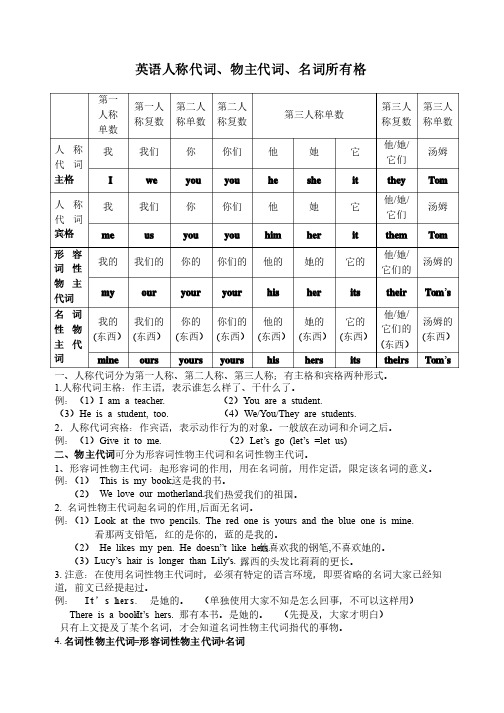
第一人称单数单数 第一人称复数称复数 第二人称单数称单数 第二人称复数称复数 第三人称单数第三人称单数 第三人称复数称复数 第三人称单数称单数 人称代词主格我 我们我们 你 你们你们 他 她 它 他/她/它们它们 汤姆汤姆 I we you you he she it they Tom 人称代词宾格我 我们我们 你 你们你们 他 她 它 他/她/它们它们 汤姆汤姆 me us you you him her it them Tom 形容词性物主代词我的我的 我们的我们的 你的你的 你们的你们的 他的他的 她的她的 它的它的 他/她/它们的它们的 汤姆的汤姆的 my our your your his her its their Tom ’s 名词性物我的我的 (东西) 我们的我们的 (东西)东西) 你的你的 (东西) 你们的你们的 (东西) 他的他的 (东西) 她的她的 (东西) 它的它的 (东西) 他/她/它们的它们的 汤姆的(东西)1.These are ( (2.Those books are . .(他们的)(他们的)3.Is this photo (你的)?(你的)?4.Is this (你的)5. (它的) 6. (她)7.The eraser is for .(她)(她) 8.Is this (她的)9.Is this bag (她的)?(她的)? 10.I don’t like .((他们)(他们) 11. (他们)12. (他们的)13.The old shoes are . .(他们的)(他们的) 14.This potato is . .((我的)(我的) 15.That tomato is .(你的)(你的) 16.This is (我的)17.That is (你的)18. 19.He will catch up with .(我们)20.The red bike is . .((他的)(他的) 21.I am worried about . .((他)(他) 22.That eraser is . (Bill 23. (我们的)(我们的) 24.These are not ( 25.The big and bright classroom is (我们的)6. Here are many dolls, which one is _________ ? ( she ) 7. I can find my toy, but where’s _________? ( you )8. Show _________ your kite, OK? (they) 9. I have a beautiful cat. _________name is Mimi. These cakes are _________. ( it ) 10. 10. Are Are Are these these these ________ ________ ________ tickets? tickets? tickets? No, No, No, ________ ________ ________ are are are not not not _________. _________. _________. ________ ________ ________ aren’t aren’t aren’t here. here. ( they ) 11. Shall _________ have a look at that classroom? That is _________ classroom. ( we ) 12. _________ is my aunt. Do you know _________ job? _________ is a nurse. ( she ) 13. That is not _________ camera. _________is at home. ( he ) 14. Where are _________? I can’t find _________. Let’s call _________ parents. ( they )15. Don’t touch _________. _________ not a cat, _________ a tiger!(it )16. _________ sister is ill. Please go and get _________. ( she ) 17. _________ don’t know her name. Would you please tell _________. ( we )18. So many dogs. Let’s count _________. ( they )19. I have a lovely brother. _________ is only 3. I like _________ very much. ( he ) 20. May I sit beside _________? ( you ) 21. Look at that desk. Those book are on _________. ( it )22.The girl behind _________ is our friend. (she ) 23. There is a letter for ________ (she) mother. 24.That is _____ (she ) coat. The coat is red. ______ (its)is a new one. 25. Whose pens are these? _______(their) are ______ (we). 26.Give _______(he) a toy, please. 27.________(we) eyes are black. _______ (us) come from Japan. 28.Tim and Bill are twins. _______ (their )are from England. _________ (them) parents are teachers in No 6 school. 29.Give the book to __________(I ). 30. These books are __________(we). 三、填上正确的人称代词和物主代词三、填上正确的人称代词和物主代词1. _____ is my friend. 他是我的朋友。
英语人称代词-物主代词-名词所有格
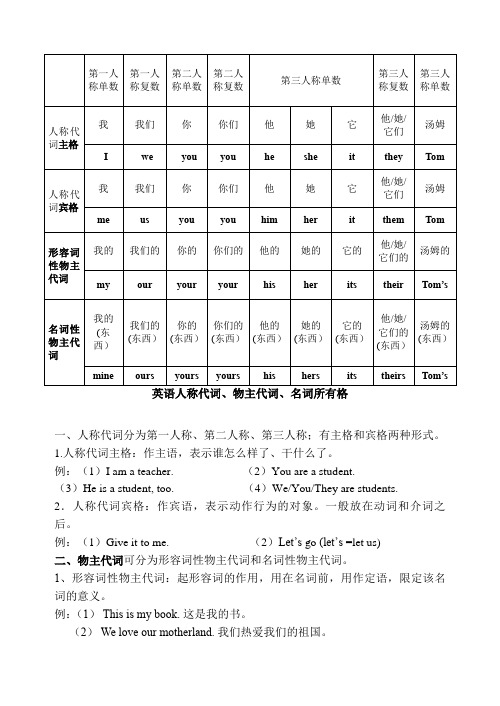
一、人称代词分为第一人称、第二人称、第三人称;有主格和宾格两种形式。
1.人称代词主格:作主语,表示谁怎么样了、干什么了。
例:(1)I am a teacher.(2)You are a student.(3)He is a student, too.(4)We/You/They are students.2.人称代词宾格:作宾语,表示动作行为的对象。
一般放在动词和介词之后。
例:(1)Give it to me.(2)Let’s go (let’s =let us)二、物主代词可分为形容词性物主代词和名词性物主代词。
1、形容词性物主代词:起形容词的作用,用在名词前,用作定语,限定该名词的意义。
例:(1) This is my book. 这是我的书。
(2) We love our motherland. 我们热爱我们的祖国。
2. 名词性物主代词起名词的作用,后面无名词。
例:(1)Look at the two pencils. The red one is yours and the blue one is mine.看那两支铅笔,红的是你的,蓝的是我的。
(2) He likes my pen. He doesn”t like hers. 他喜欢我的钢笔,不喜欢她的。
(3)Lucy’s hair is longer than Lily's. 露西的头发比莉莉的更长。
3. 注意:在使用名词性物主代词时,必须有特定的语言环境,即要省略的名词大家已经知道,前文已经提起过。
例:It’s hers. 是她的。
(单独使用大家不知是怎么回事,不可以这样用)There is a book. It’s hers. 那有本书。
是她的。
(先提及,大家才明白)只有上文提及了某个名词,才会知道名词性物主代词指代的事物。
4. 名词性物主代词=形容词性物主代词+名词名词性物主代词在一定情况下可以用“形容词性物主代词+名词”来转换;有时为避免重复使用名词,也可用“名词性物主代词”来代替“形容词性物主代词+名词”的形式。
名词所有格和人称代词

THANKS
感谢观看
人称代词在句子中的应用
人称代词用于代替前面提到的名词,避免重复,例如"I like the book. It is very interesting."中的"it"代替前面的"the book"。
人称代词可以用于表示疑问、请求等,例如"Who is it?"表示谁在敲门,"Can you help me?"表示请求帮助。
强调
通过强调人称代词来加强 语气或表达情感,如“我 告诉你”、“他们绝对不 会答应”。
替代
使用人称代词来替代名词 或名词短语,以避免重复 ,如“他是我朋友”、“ 他们那些人”。
03
CATALOGUE
名词所有格和人称代词的对比
用法的异同
01
02
03
04
名词所有格
表示某物的所有关系,通常在 名词后面加's表示,例如 “John's book”。
名词所有格的用法
表示某人的物品
例如,my brother's car,表示我兄弟的车。
表示某组织的成员物品
例如,the company's office,表示公司的办公室。
表示时间、距离、国家等抽象概念的某部分
例如,today's newspaper,表示今天的报纸。
名词所有格的特殊情况
要点一
当物品为两个人共同所有时,只 在最后一个人的名字后面加“…
第三人称:他、她、 它、他们
第二人称:你、你们
人称代词的用法
01
02
03
第一人称
用于表达说话人的观点和 立场,如“我认为”、“ 我们决定”等。
最新英语人称代词-物主代词-名词所有格
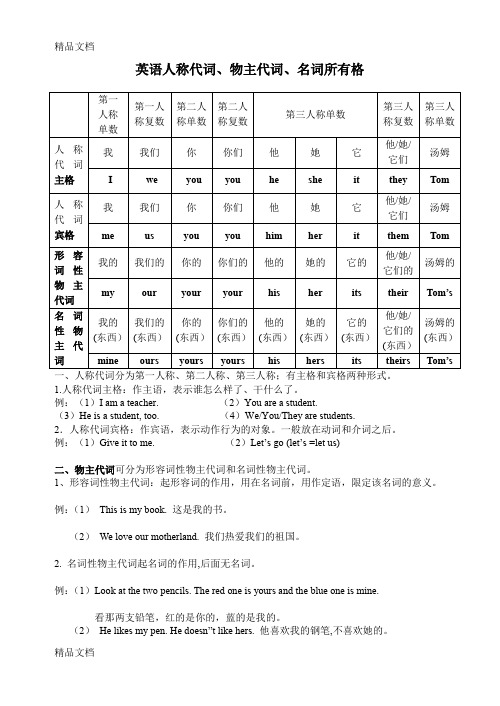
英语人称代词、物主代词、名词所有格1.人称代词主格:作主语,表示谁怎么样了、干什么了。
例:(1)I am a teacher. (2)You are a student.(3)He is a student, too. (4)We/You/They are students.2.人称代词宾格:作宾语,表示动作行为的对象。
一般放在动词和介词之后。
例:(1)Give it to me. (2)Let’s go (let’s =let us)二、物主代词可分为形容词性物主代词和名词性物主代词。
1、形容词性物主代词:起形容词的作用,用在名词前,用作定语,限定该名词的意义。
例:(1)This is my book. 这是我的书。
(2)We love our motherland. 我们热爱我们的祖国。
2. 名词性物主代词起名词的作用,后面无名词。
例:(1)Look at the two pencils. The red one is yours and the blue one is mine.看那两支铅笔,红的是你的,蓝的是我的。
(2)He likes my pen. He doesn”t like hers. 他喜欢我的钢笔,不喜欢她的。
(3)Lucy’s hair is longer than Lily's. 露西的头发比莉莉的更长。
3. 注意:在使用名词性物主代词时,必须有特定的语言环境,即要省略的名词大家已经知道,前文已经提起过。
例:It’s hers. 是她的。
(单独使用大家不知是怎么回事,不可以这样用)There is a book. It’s hers. 那有本书。
是她的。
(先提及,大家才明白)只有上文提及了某个名词,才会知道名词性物主代词指代的事物。
4. 名词性物主代词=形容词性物主代词+名词名词性物主代词在一定情况下可以用“形容词性物主代词+名词”来转换;有时为避免重复使用名词,也可用“名词性物主代词”来代替“形容词性物主代词+名词”的形式。
英语人称代词_物主代词_名词所有格
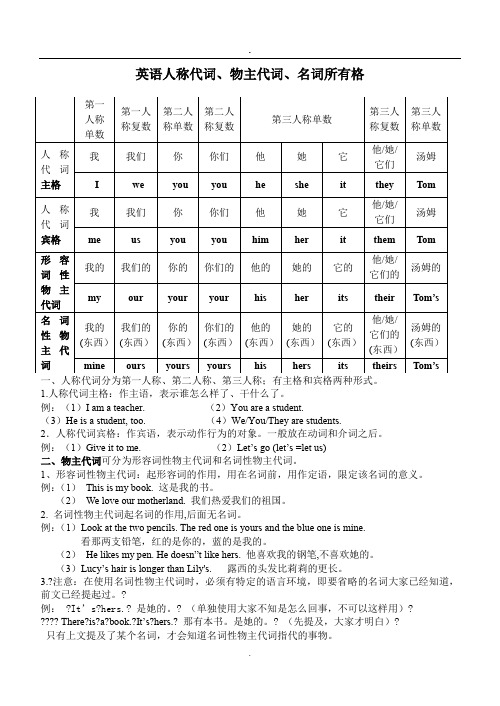
英语人称代词、物主代词、名词所有格1.人称代词主格:作主语,表示谁怎么样了、干什么了。
例:(1)I am a teacher. (2)You are a student.(3)He is a student, too. (4)We/You/They are students.2.人称代词宾格:作宾语,表示动作行为的对象。
一般放在动词和介词之后。
例:(1)Give it to me. (2)Let’s go (let’s =let us)二、物主代词可分为形容词性物主代词和名词性物主代词。
1、形容词性物主代词:起形容词的作用,用在名词前,用作定语,限定该名词的意义。
例:(1)This is my book. 这是我的书。
(2)We love our motherland. 我们热爱我们的祖国。
2. 名词性物主代词起名词的作用,后面无名词。
例:(1)Look at the two pencils. The red one is yours and the blue one is mine.看那两支铅笔,红的是你的,蓝的是我的。
(2)He likes my pen. He doesn”t like hers. 他喜欢我的钢笔,不喜欢她的。
(3)Lucy’s hair is longer than Lily's. 露西的头发比莉莉的更长。
3.?注意:在使用名词性物主代词时,必须有特定的语言环境,即要省略的名词大家已经知道,前文已经提起过。
?例:?It’s?hers.? 是她的。
? (单独使用大家不知是怎么回事,不可以这样用)? ???? There?is?a?book.?It’s?hers.? 那有本书。
是她的。
? (先提及,大家才明白)?只有上文提及了某个名词,才会知道名词性物主代词指代的事物。
4.?名词性物主代词=形容词性物主代词+名词??名词性物主代词在一定情况下可以用“形容词性物主代词+名词”来转换;有时为避免重复使用名词,也可用“名词性物主代词”来代替“形容词性物主代词+名词”的形式。
- 1、下载文档前请自行甄别文档内容的完整性,平台不提供额外的编辑、内容补充、找答案等附加服务。
- 2、"仅部分预览"的文档,不可在线预览部分如存在完整性等问题,可反馈申请退款(可完整预览的文档不适用该条件!)。
- 3、如文档侵犯您的权益,请联系客服反馈,我们会尽快为您处理(人工客服工作时间:9:00-18:30)。
人称代词、物主代词、所有格5.练习题(20小题)用所给词义的适当形式填空1. _______ is a teacher. (他)2. -Where is_______? I can’t find.(他)-_______is in the classroom. (他)3.is a good girl. Everyone likes_____. (她)4. I like her pencil case. _______ is nice! (它)5. _______ (他们) are twins.6. _______like English very much. (我们)7. Can_______ (你) read it for_______? (我们)8. _______ (你们) are from England. _______ (我们) are from China. 10. Can you give_______to me? (它)用括号中代词的适当形式填空1.Her sister is helping ______ (we).2. John and I are in the same school. (we) go to school together.3. Everyone likes_____ ( she).4.______ (I) have many friends. Some of (they)are good at English.5. Jim is English. ________ (I) like playing with _______ (he)6.I love ________(they)very much.7.Miss Li often looks after________(she)8.They are waiting for__________(they).9. Do you like Li Ming? No, ______ (I) don’t like _____.(he)10. Danny gives the book to ______. (you)5. 练习(10小题)用括号中代词的适当形式填空1. That is not ____kite. That kite is very small, but _____ is very big. (I)2. The dress is _________. Give it to _________. (she)3. Is this ________ watch? (you) No, it’s not ________. ( I )4. ____ is my brother. _____ name is Jack. Look! Those stamps are ___. (he)5. ____ dresses are red. (we) What color are ___ ? ( you )6. Here are many dolls, which one is _____ ? (she)7. I can find my toy, but where’s _________? (you)8. Shall ____ have a look at that classroom? That is ____ classroom. (we)9. I have a beautiful cat. ____name is Mimi. These cakes are _____. (it)10. Are these ____ tickets? No, _____ are no t ____. ____ aren’t here. (they)(6)按要求写出下列代词的形式1、I(宾格)________2、he(形容词性物主代词)________3、us(主格)________4、they(宾格)________5、she(宾格)________6、you(名词性物主代词)-________7、it(宾格)________8、him(复数)________9、her(形容词性物主代词)________10、my(复数)________11、they(名词性物主代词)________ 12、we(单数)______(7)选择题。
1. Look at . A. him B. he C. his2. I drive to the park every day.A. they B. their C. them3. classroom is big. A. we B. us C. Our4. I love . A. she B. her C. hers5. Do you know ? A. I B. my C. me6. I am son. A. they B. their C. them7. This is not _____ desk.. My desk is over there.A. I B. my C. me8. -Can you spell _____ name, Harry? -Sorry.A. you B. your C. yours9. Tom and Jack are brothers. This is _____ room.A. they B. them C. their10. We are in the same class. _____ classroom is very niceA. our B. my C. ours11. Mrs Green is my teacher. I’m _____ student.A. he B. his C. him()12. That’s a cat. _____ name is Mimi.A. It B. It’s C. Its名词所有格及练习讲解名词所有格是名词的语法范畴之一。
它是名词和代词的一种变化形式,在句中表示与其它词的关系。
名词有三个格:主格、宾格和所有格。
在英语中有些名词可以加“’s”来表示所有关系,带这种词尾的名词形式称为该名词的所有格,如:a teacher’s book。
它有两种不同的形式:一、在名词尾加’s。
主要表示有生命的事物或自然界独一无二的某些空间和时间名词的所有格,如the world’s,the sun’s,the earth’s,today’s,yesterday’s等。
1. 单数名词词尾加“’s”,复数名词词尾没有s,也要加“’s”。
例the boy’s bag 男孩的书包men’s room 男厕所2. 若名词已有复数词尾又是s ,只加“ ’ ”。
例the workers’ struggle工人的斗争3. 凡不能加“’s”的名词,都可以用“名词+of +名词”的结构来表示所有关系。
例the title of the song 歌的名字4. 在表示店铺或教堂的名字或某人的家时,名词所有格的后面常常不出现它所修饰的名词。
例the barber’s 理发店5. 如果两个名词并列,并且分别有’s,则表示“分别有”;只有一个’s,则表示“共有”。
例John’s and Mary’s room(两间)John and Mary’s room(一间)6. 在复合名词或短语中,’s 加在最后一个词的词尾。
例 a month or two’s absence7.作为一个整体的词组,一般在最后一个词的词尾加’s。
例an hour and a half’s walk (步行一个半小时的路程)Carol and Charles’ boat (卡咯和查尔斯两人共有的船)8. 不定代词后接else , 所有格放在else 上。
例somebody else’s bag9. 下列情况可以将’s 所有格中的名词省略。
1)名词所有格所修饰的词, 如果前面已经提到,往往可以省略,以免重复。
例This notebook is not mine, nor John’s, nor Peter’s. 这个笔记本不是我的,也不是约翰和比特的。
The dicti onary isn’t mine, but Jenny’s. 这本词典不是我的,而是珍妮的。
2)名词所有格后面有指地点等的名词时, 有的在习惯上可以省略。
例Before Christmas, there were lots of customers at the Richardson’s.the doctor’s(office)医生的诊所my uncle’s(house)我叔叔的家10.起修饰作用的名词,如不表示所有关系,通常不用’s。
例room number tooth brush二、另外一种所有格是由介词of加名词构成的名词短语1.名词的所有格形式除’s外,还可用of+名词构成短语修饰前面的名词或表示两个名词间的所有关系。
2. 使用名词所有格须注意: 一般地说,’s 所有格多用于有生命的东西,of所有格多用于无生命的东西,但也有许多例外。
1)表示天体的名词的所有格用’s。
例the sun’s heat the moon’s surface2)表示地区机构的名词的所有格用’s。
例the city’s deve lopmentthe government’s plan3)表示度量与货币价值的所有格用’s。
例ten kilometres’ distance200 dollars’ worth of goods4)表示“有关……”非所有关系的用of 介词短语。
例students of the school the statue of liberty5)表示同位关系的用of 介词短语。
例the city of Pisa6)表示部分或全部的用of 介词短语。
例the bottom of the sea the majority of people7)表示抽象概念的用of 介词短语。
例the cost of living the news of success8)名词本身带有后置修饰语或含有“the + 形容词”表示一类人,其所有格用of 介词短语。
例the housing problem of the poorthe skills of the workers who have been well trained9)有些表示时间、距离等无生命和表示世界、国家、城镇等的名词,也可以在词尾加’s或“ ’ ”,变成相应的所有格。
例five minutes’ walk 五分钟的路程today’s newspaper 今天的报纸3.双重所有格双重所有格即“ of + 名词’s 所有格”,表示整体中的一个或部分。
